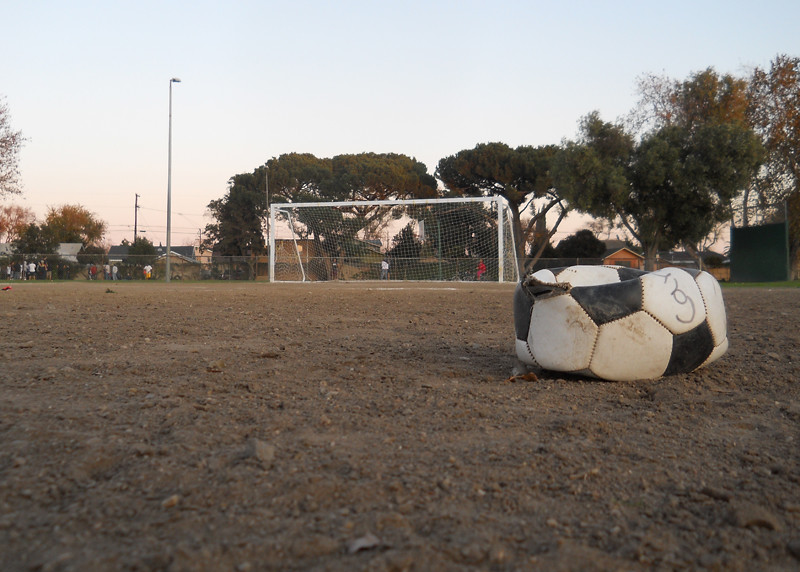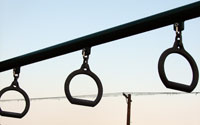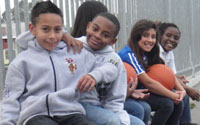Maria Mendoza
Maria Mendoza uses her store to provide her community with the means to play the sport it loves: Futbol
Mount Carmel Park is more than just a safe haven to keep kids busy and off the streets after school, the staff and those who have grown up at the park are a family. Cesar Ramirez, the park’s director, creates an environment where his team has the freedom to do their jobs and the kids get the perfect balance of discipline and love.
This media piece focuses on the children of Los Angeles and their education. The piece will delve into a prominent after school program in Los Angeles called LA’s Best. The audio slideshow will be composed of several LA’s Best students and what they do while they are in the program. Lastly, there will be a 360 virtual tour of the 68th Street Elementary School, which is one of the schools that participate in the program.
By Nick Edmonds
The bell rings. A single sound that announces my presence to a seemingly empty store. A shy hispanic woman cautiously comes forward and says hello. She is Maria Mendoza, saleswoman at Deportes Guadalajara, a local sports store in the Florence-Graham neighborhood of Los Angeles. It is clear she questions my motives, as I am not like her usual customers: In other words, I am white. "Can I help you?" she asks warily, looking me up and down and noticing not only my backpack but the camera in my hand. I act fast, and begin talking to her about soccer. Almost instantly her mood changes. She lights up and it is clear that soccer means the world to her.
As I look around the store walls covered in colorful unique soccer equipment and memorabilia, Maria opens up about her love of the game. At 37 years old, she still plays the game that means so much to her. She tells me of the great pride she feels being able to provide the people of the neighborhood the means to play soccer. She tells me that, to the Mexican-Americans of the community, soccer is much more than a game. It is a tradition passed down from generation to generation. It is an identity. It is a way of life.
But there is a problem. Poor maintenance and a lack of city funding has threatened the community's ability to play the game they love. For a community predominantly made up of Mexican-Americans, Maria tells me that there is a major shortage of soccer parks and fields, both in quality and quantity.
Members of the neighborhood looking to play soccer can try Jesse Owens Park, but the fields are primarily taken up by schools or clubs (which many locals cannot afford to be in). The other option is Franklin D. Roosevelt Park on the 76th block of Graham Ave. But sadly, the soccer field there has become a desolate wasteland with little to no grass, meaning little to no people playing.
I decided to make the trip to the field myself and was in awe to see how bad the field conditions had gotten, especially for a sport which is so seemingly popular among the community. Deflated balls, garbage wrappings, and wide spans of dry, cracked dirt was all I saw. I managed to find a few young kids kicking an old ball around and asked them where everyone had gone. A young Mexican teenager, Alex Rivera, points to a concrete volleyball court across the way. It seemed that all the people who once loved to play soccer, had moved to the volleyball courts. Confused, I asked why and the answer was tragic.
Alex told me how the field had deteriorated to the point that no one wanted to use it anymore. He's seen balls get popped, players tripped, and ankles rolled, all because the care and dedication shown to the field does not nearly match that shown by the community for the sport. Alex wishes someone would put more money into the soccer field, as he only wants to go back to playing the game he was raised to love even before he could walk. He tells me how his father taught him the game, and now his brothers look up to him to learn for themselves. But if there are no places for people like Alex to play soccer, the Mexican American community of the Florence Graham neighborhood is in danger of losing a paramount aspect of their culture, one that has been a part of them for decades.
Hearing the stories of Maria Mendoza and Alex Rivera have opened my eyes to a world of fanaticism and passion that I now see I have truly underestimated. Maria continues to keep the tradition of soccer in the Mexican American community alive by providing equipment and being a role model for younger generations of soccer fans.
It is people like Alex Rivera who will continue to stand up and fight for the right to play the sport he loves in a safe and friendly environment. These two people alone have shown be what great things can come from a community working toward a common goal. If soccer fields in the area like Roosevelt Park can be renovated and turned into a point of pride to its patrons rather than a blemish on the park as a whole, the community would benefit greatly and the Mexican American members of the community can continue on their storied tradition and preserve their culture for generations to come.



